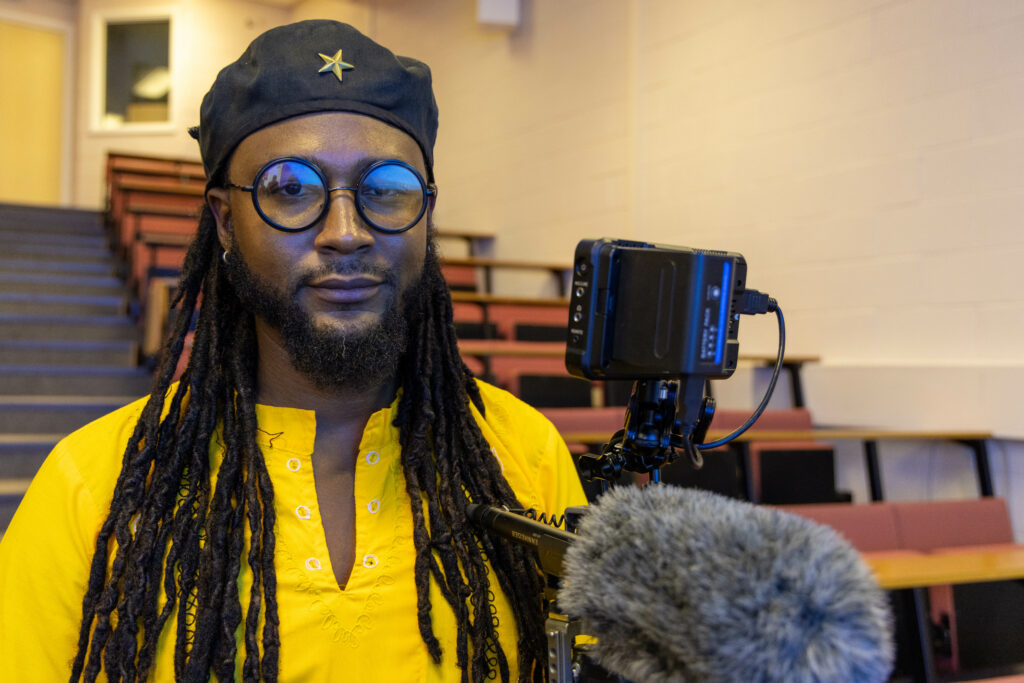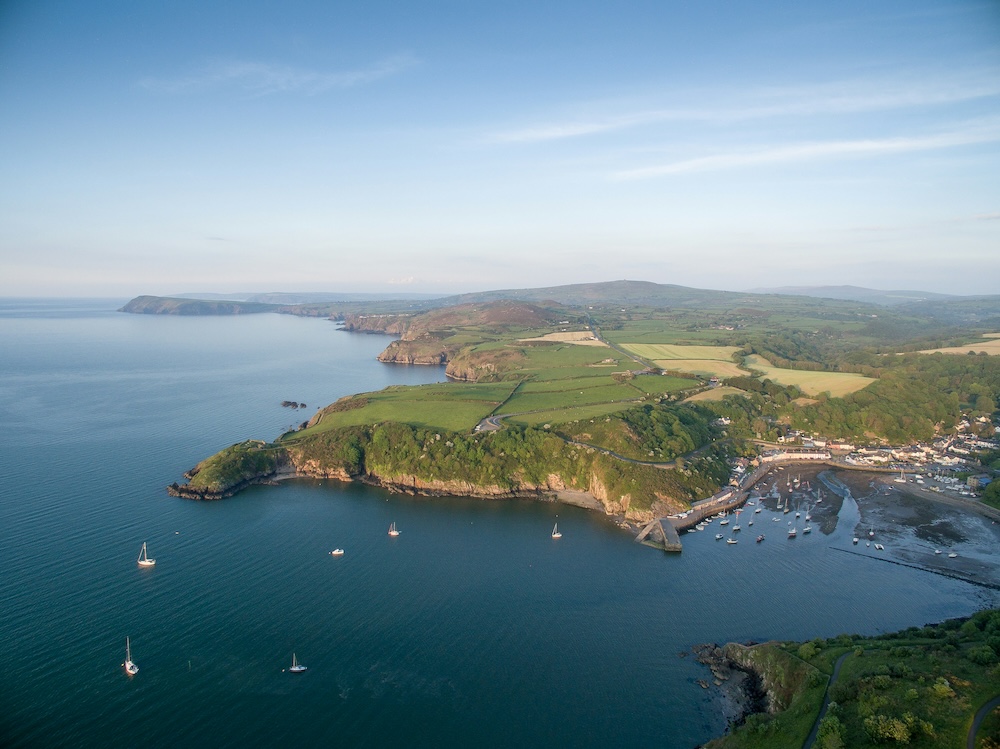Andy Bevan discusses the University of Wales Trinity St David and its slavery links with St Vincent.
Akley Olton, an award-winning film-maker from St Vincent and the Grenadines, has released a film, Sugar Lands, exploring slavery links between Wales and his small island state. The film was commissioned in 2022 by the University of Wales Trinity St David (UWTSD). Decolonisation of the curriculum is now an important issue at most of the older universities and the college at Lampeter is no exception.
“Phillips’s status as a slave owner has been downplayed in previous historiography – and in the university’s own publicity.”
In Lampeter, however, decolonisation is not just a curriculum issue. The spectre of slavery looms large over the very founding of the college, not least because one of the major benefactors of St David’s College, Thomas Phillips (1760-1851), was a slave owner on the Caribbean island of St Vincent.
The foundation stone at St David’s College, Lampeter, was laid on 12 August 1822, and UWTSD – of which the Old College in Lampeter is now a part – celebrated this bicentenary last year.
How to deal with the Thomas Phillips connection was one of the challenges facing UWTSD in the run-up to its bicentenary year. In a press release issued by UWTSD in July 2020, my former colleague, Dr Alexander Scott, who is now based at the International Museum of Slavery in Liverpool wrote: “Phillips’s status as a slave owner has been downplayed in previous historiography – and in the university’s own publicity.”
To illustrate the point, if you view the webpage entitled The Thomas Phillips Collection, you will read about Phillips’ philanthropy in donating 22,500 books to St David’s College from the 1830s onwards, £7,000 in bank shares (worth about £1m today) and sponsoring various professorships. But there is no mention there of Phillips’ involvement in private trade with China while working for the East India Company in Bengal or his purchase of the Camden Park plantation in St Vincent for £40,000 on his retirement from the Bengal Medical Service in 1817. There is no mention there, either, that he received £4,737 in government compensation (in 1836) as a result of the emancipation of “his” 167 slaves.
I am pleased to report, though, that a marble bust of Thomas Phillips, which for many years held pride of place in the Old Hall at UWTSD Lampeter, was finally removed from there in November 2021, after a short campaign.
Robust debate and agenda-setting research.
Support Wales’ leading independent think tank.
In further examining Thomas Phillips’ role as a slave owner on St Vincent, it became clear that, according the UCL slavery database, very soon after Phillips took ownership of Camden Park in 1817, 85 slaves from the nearby island of Cariacou were added to his plantation labour force. This forced transfer almost certainly meant the break-up of families and I felt that, given the fact that descendents of people enslaved at Camden Park are alive in St Vincent today, I ought to seek expert local advice and research skills. I was able, in November 2020, to get in touch with Dr Adrian Fraser, the former Head of the University of the West Indies campus on St Vincent, who can fairly be described as the island state’s foremost historian. Dr Fraser has added research into the history of Camden Park both before and after the abolition of slavery, to his existing programme of work. This includes searching local records and unravelling modern-day legacies of the Camden Park plantation, as well as examining plantation management during the “Apprenticeship period” 1834-1838, which immediately followed “Emancipation”. Under the Apprenticeship provisions, former slaves were tied to the same estates and compelled to undertake unpaid labour. Importantly, Dr Fraser has also researched the history of Vincentian land reform struggles in the 1840s and 1850s, and beyond.
At the same time, Akley Olton agreed to interview Dr Fraser and modern-day Camden Park residents, making a film to disseminate the results of the local research programme.
Alongside these links, other connections have been fostered between UWTSD and St Vincent. UWTSD’s Vice-Chancellor, Prof. Medwin Hughes, wrote to the Prime Minister of St Vincent in June 2021, offering 55 scholarships to students from St Vincent and the Grenadines (SVG), with effect from 2021/22, in a package valued at £1.5m. This was prompted by a wish to respond to SVG’s educational needs in the immediate aftermath of the eruption of La Soufrière volcano in April-May 2021. As reported to Vincentians in a podcast by Dr. Ralph Gonsalves, their Prime Minister, this initiative arose from an approach by the then heir to the British throne – who visited St Vincent in March 2019 and who has for many years been a Patron of UWTSD – to UWTSD’s Vice-Chancellor in April 2021.
UWTSD has begun to examine its own links with slavery and issues of acknowledgement, redress and reparations.
This new and ongoing link between UWTSD and SVG has been widely publicised and welcomed in St Vincent and the full cohort of scholars – much delayed by the UK Government’s visa regime requirements – arrived in late January 2022, after a period of online study. Meanwhile, here in Lampeter, attempts continue to be made to ensure that these scholarships should be specifically framed as part of ongoing efforts by UWTSD to acknowledge and address fully its long-standing connection, as a result of the slave ownership of one of its prominent Founders, with colonialism and slavery in St Vincent and the Grenadines.
Innovative. Informed. Independent.
Your support can help us make Wales better.
On 27 September 2022, the Prime Minister of St Vincent and the Grenadines, Dr Ralph Gonsalves, visited Lampeter to meet the scholarship students. He reminded them that one of their national heroes, Captain Hugh Mulzac, the first black seafarer to become master of a US-registered cargo vessel, the Liberty ship SS Booker T Washington, in 1942, had gained his second mate’s ticket in Swansea (in 1909). Dr Gonsalves also appealed for the connection between SVG and UWTSD to continue into the future.
The theme under which the research project with Adrian Fraser and Akley Olton was launched was “Vincentian voices will be heard”, in connection with the UWTSD bicentenary. One of the messages arising from this joint work rings out loud and clear. Akley Olton’s new film ends with an appeal for reparatory justice, highlighting demonstrations on this very question in St Vincent in April 2022, at the time of the last royal visit there.
UWTSD has begun to examine its own links with slavery and issues of acknowledgement, redress and reparations. In the run-up to the coronation and given the personal interest of the new monarch in these matters, we should also call for an independent audit of the links of the British monarchy with slavery and plantation profits, from Tudor and Stuart times to the present, establishing how much of the assets held by the Crown Estate, the Royal Collection, the Duchies of Lancaster and Cornwall and other relevant repositories of wealth, are derived from slave ownership from the early days of British colonialism and Empire. Such an audit would certainly be germane to issues of reparations for colonialism, very much a pressing, live and widely supported call across the Caribbean today.
All articles published on the welsh agenda are subject to IWA’s disclaimer. If you want to support our work tackling Wales’ key challenges, consider becoming a member.
This article was edited by Kaja Brown thanks to the Books Council of Wales’ New Audiences Fund.





